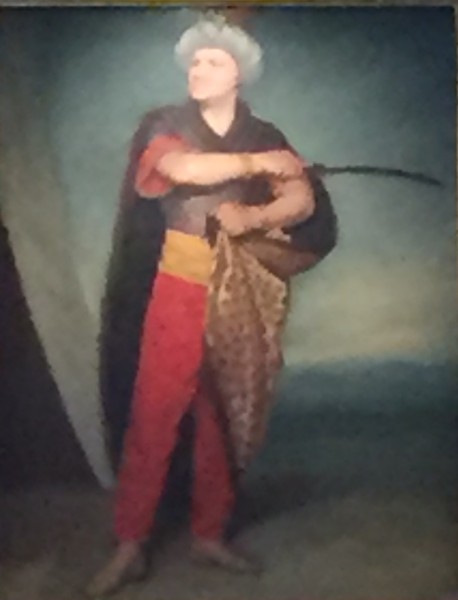Home
/
G0285
Paintings: G0285
Title
George D. Harley
Technique
Oil on canvas
Subject
Character
Caled : The Siege of Damascus
Artist
Dimensions
Height: 37cm
Width: 28.5cm
height (frame): 47cm
width (frame): 38cm
Width: 28.5cm
height (frame): 47cm
width (frame): 38cm
Provenance
John Bell; Thomas Harris; Harris sale, Robins 12 July 1819 (63); Charles Mathews
Other number
Mathews 178 RW/CKA 255
Exhibition history
1833 London, Queen's Bazaar, Oxford Street, "Mr Mathews's Gallery of Theatrical Portraits" (178)
1962 Chichester, Chichester Antiques Ltd, "The Painter and the Stage" (22)
Engraving history
Wilson for Bell's British Library 1 June 1793, line 11.45 x 7.95 pub. “Bell's British Theatre” (1797) vol 12, with the quotation "What, dost thou frown too!"
Caled is the general of the Saracen army and has been laying siege to Damascus, held by the Christians under Eumenes. Act V, scene 2, shows the Christian camp outside Damascus, "A Valley full of Tents; Baggage and Harness lying up and down amongst them. The Prospect terminating with Palm trees and Hills at a Distance." Caled has broken his word and attacked the Christians. He is confronted by Phocyas and asks why he frowns. Phocyas tells him he has broken his promise and kills him. The text calls for Caled to carry a lance rather than a scimitar as shown by De Wilde.
Caled wears a white turban bound with gold with a crescent moon at front, yellow slippers and sash, scarlet trousers and fish-scale body armour decorated with diagonal scarlet stripes; this armour conceals a shirt of which we see the short scarlet and yellow sleeves, and a dark fur collar that matches the trimming of a long leopard-skin cloak.
Hughes's tragedy was originally performed at Drury Lane on 17 February 1720. Harley never played Caled in London. The last performance of the play in London in the 18th century was at Covent Garden on 28 February 1785, when Henderson played Caled.
Caled wears a white turban bound with gold with a crescent moon at front, yellow slippers and sash, scarlet trousers and fish-scale body armour decorated with diagonal scarlet stripes; this armour conceals a shirt of which we see the short scarlet and yellow sleeves, and a dark fur collar that matches the trimming of a long leopard-skin cloak.
Hughes's tragedy was originally performed at Drury Lane on 17 February 1720. Harley never played Caled in London. The last performance of the play in London in the 18th century was at Covent Garden on 28 February 1785, when Henderson played Caled.




